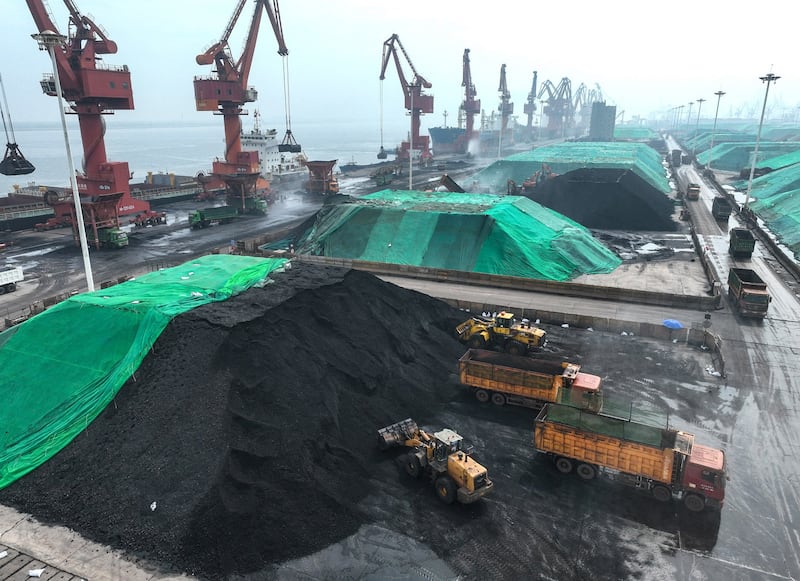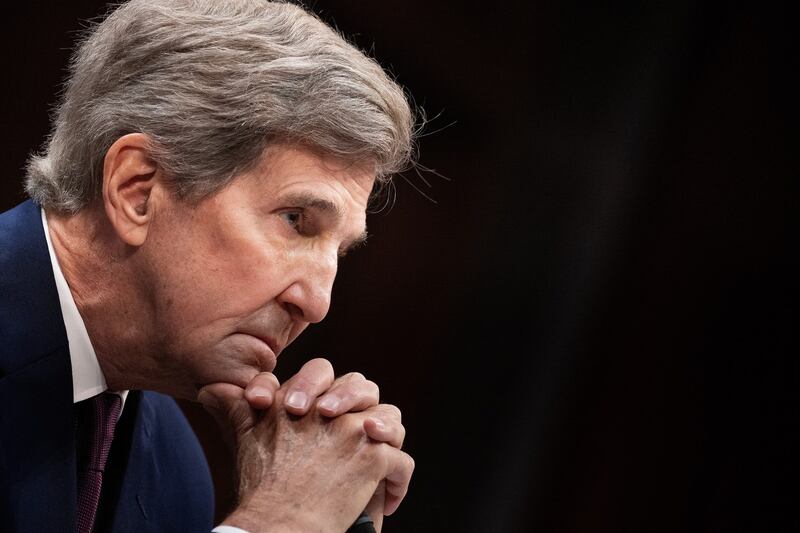China won’t surrender its status as a “developing nation” any time soon due to the benefits it confers, U.S. climate envoy John Kerry said Thursday ahead of a trip to Beijing, even as he acknowledged the designation had poor optics given China is the world’s largest carbon polluter.
Kerry also told lawmakers that concerns about human rights abuses in China should not stop cooperation to mitigate climate change.
Appearing before the House Foreign Affairs Committee ahead of talks in Beijing next week, Kerry was asked by Chairman Michael McCaul, a Republican from Texas, whether he would push Chinese officials to surrender the self-designation of "developing nation."
“It just continues to baffle me that the second-largest economy in the world is somehow treated as a developing nation,” McCaul said, complaining that it both lets Beijing access cheaper World Bank loans and commit to less stringent carbon-reduction goals.
China, he noted, plans to continue increasing carbon emissions until 2030 and then start a program of reductions to reach carbon neutrality by 2060, despite already being the world’s leading annual emitter.

“I talk to my constituents back home and say, ‘Yeah, you know, Secretary Kerry's going over there trying to save the world. It's great, but hey, guess what? China doesn't have to comply till 2060, because they lie and say they're a developing nation,’” McCaul said.
“The United States,” he continued, “we’ve got to comply almost immediately. The American people understand fairness. And honestly, sir, they do not see this as fair.”
Be realistic
Kerry replied that he understood the poor optics of the designation.
“I can't disagree with that. They do not see it as fair,” Kerry said, adding it was not only McCaul’s constituents who were “concerned about this differential in the designation” with the United States.
“With respect to this developed/developing [question] it should confound anybody at this point in time – and it's one of the topics I've raised this with my counterpart in China and others,” Kerry said.
Kerry said he believed the United Nations would “revisit” the issue of development designations next year, but that he did not expect Beijing to surrender “developing” status next week due to U.S. pressure.
“Let me just be frank with you: That's not going to happen,” the climate envoy said. “It’s just not going to happen on this visit. But the Chinese government understands that this is a growing issue of concern.”
Big but developing
China is by far and away the world's largest carbon emitter, according to the latest World Bank data, emitting more carbon dioxide each year than the next seven-placed countries – the United States, India, Russia, Japan, Iran, Germany and South Korea – do combined.
But the question of the development status of the world’s second-largest economy is complicated.
While the United Nations allows countries to self-designate their status – to the chagrin of lawmakers like McCaul – other institutions have more concrete metrics, and China is only just reaching the top tier.
The World Bank, for instance, puts in its top bracket of " high income countries" only those that have a per-capita annual gross national income of above US$13,205. Last year, China fell a few hundred dollars short of that – at $12,805 – and was far behind most Western countries. The United States, by comparison, reached $76,370.
When it comes to responsibility for climate change, China has also emitted less in total than the United States over the course of history, due to the much earlier industrialization of the Western world.
That has not gone unremarked upon by Chinese officials.
"Requiring a country that has only been developing for a few decades to shoulder the responsibilities of those industrial countries who have developed for hundreds of years, this itself is unfair," China's top diplomat, Wang Yi, said during a press conference in 2019.
Uyghur slave labor
During the hearing, Kerry was also pressed over an interview he gave to Bloomberg last year in which he appeared to downplay the treatment of Uyghurs by Beijing, which the United States has termed a genocide.

Kerry was asked in the interview if he had concerns about negotiating climate change mitigation given China’s rights abuses.
“Well, life is always full of tough choices in the relationship between nations,” he replied, pointing out that U.S. President Ronald Reagan met Soviet President Mikhail Gorbachev in the 1980s to seek deals on nuclear weapons despite calling the Soviet Union as “the evil empire.”
“The point I’m making is that, even as there were egregious human rights issues, which Ronald Reagan called them out on, we have to find a way forward to make the world safer, to protect our countries and act in our interests. We can do and must do the same thing now.”
On Thursday, Kerry reiterated that point, after being asked by Rep. Cory Mills, a Republican from Florida, if he thought it was a "tough choice" whether the United States should import solar panels "built on the backs of Uyghur slaves" in order to reduce carbon emissions.
He replied he often brought up concerns about the treatment of Uyghurs in China during his talks, but that it would be “malpractice of the worst order” for the United States not to engage the second-largest economy on climate change due to its human rights concerns.
“We don't have to wrap [our priorities] up,” Kerry said, “so one becomes hostage to the other, where you don't make progress.”
